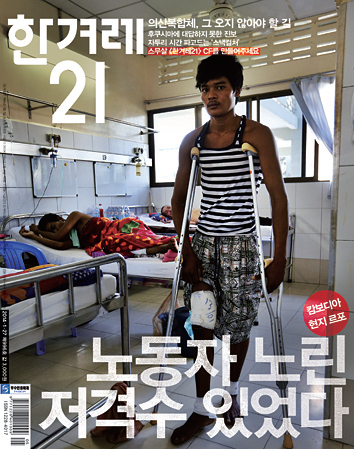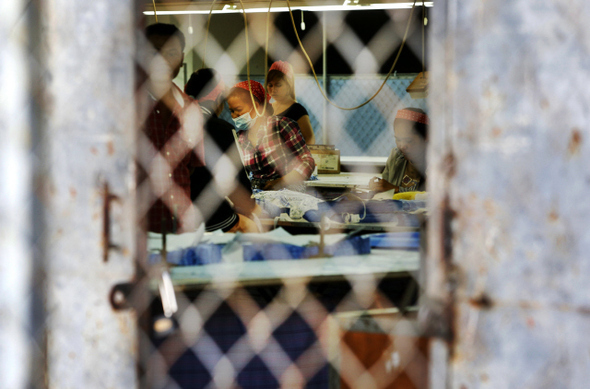 |
The Jan, 27, 2014 edition of Hankyoreh 21 weekly magazine
|
Posted on : Dec.28,2014 KST, The Kankyoreh
“I got lucky,” said Chhim Thoeun, 27, a migrant worker from Cambodia. Just when Thoeun had wanted to return to work at the factory, the company came to see him and gave him US$100 for his medical fees. He received a health checkup at Calmette Hospital and went back to work.
Thoeun is employed at Yakjin Trading Corporation, the South Korean company operating in Cambodia that was rumored to have violently suppressed striking workers in January of this year.
After taking part in the protest on the morning of Jan. 2, Thoeun returned to his dormitory. After hearing about what was happening outside, he was just leaving the building when soldiers seized him. After five months in prison, he returned to work, but his Cambodian manager warned him not to join the labor union.
Thoeun makes US$150-160 a month, when you combine his basic pay of US$117 with overtime pay five days a week. It’s not easy for him to keep food on the table for his parents and his younger brother.
Thoeun may have been reinstated to his job, but this was far from the norm. Pressure from investors at Yakjin appears to have played a role.
This past September, Forbes magazine covered a visit to Yakjin by lawyers from US firm Carlyle Group in mid-August.
After the bloody crackdown on the strike, human rights advocates put pressure on CaLPERS (California Public Employees’ Retirement System), which invests in the Carlyle Group. This pressure seems to have been passed along to the Carlyle Group, which holds shares in Yakjin.
How much did wages go up after the bloody suppression of the strike? In November, the Cambodian Labor Ministry set the 2015 minimum wage at US$128. This is less than the US$140 that the union had announced to be the minimum amount, and it falls far short of the US$396 that the Asia Floor Wage Alliance calculates is a living wage in Cambodia.
Athun, president of the labor union, is fighting against the decision. For his part, Thoeun says that he will follow Athun‘s lead. “If there’s another strike, I‘ll take part,” he said.
 |
Workers at a factory in Phnom Penh, Jan. 14. At the time, most factories were not fully operating due to a crackdown by police that kept many workers away. (by Kim Myung-jin, staff photographer)
|
Please direct questions or comments to [english@hani.co.kr]
Workers at a factory in Phnom Penh, Jan. 14. At the time, most factories were not fully operating due to a crackdown by police that kept many workers away. (by Kim Myung-jin, staff photographer)

No comments:
Post a Comment